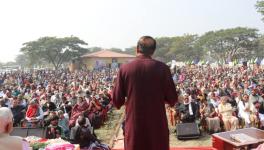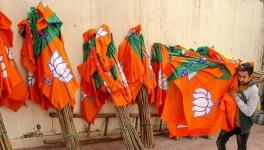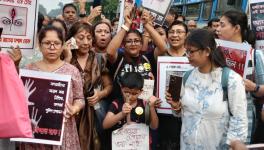Why TMC Desertions Are Mixed Blessing for BJP and Rebels
Representational use only.
With Assembly elections approximately six months away, West Bengal politics is in turmoil due mainly to the defection from the ruling Trinamool Congress (TMC) of Nandigram MLA and Purba Medinipur district strongman Suvendu Adhikari.
There can be little doubt that Suvendu’s defection to the Bharatiya Janata Party (BJP) at Union Home Minister Amit Shah’s Medinipur rally on Saturday, along with some adherents, has boosted the party. But before we begin to analyse the emerging picture, let us look at what has actually happened.
Suvendu’s flip hardly comes as any kind of surprise. His brinkmanship, provoked ostensibly by the promotion of party chief Mamata Banerjee’s nephew, Diamond Harbour MP Abhishek Banerjee, as heir apparent, has been evident for a couple of months. Peace talks were held on 1 December with senior leaders, less than a week after he quit his three ministerial positions. There was even a telephonic conversation with Mamata. By the time that went awry, it had become evident that Suvendu was headed into the BJP.
Before we assess Suvendu’s strengths, we need to look at those who are joining him in the saffron “cowshed” and the dynamics of defection. In Pashchim Bardhaman district, Pandabeshwar MLA and Asansol Municipal Corporation (AMC) mayor/administrator Jitendra Tiwari quit the party on Thursday, a day before he was supposed to have a conversation with Mamata. Suvendu’s actions brooked no ambiguity, but Tiwari’s did not. He first quit his position as Asansol mayor, but remained in the party and retained his membership of the House. The question, in the context of the scheduled meeting with Mamata, is why Tiwari did not resign from his Assembly membership. He claimed on Thursday that since the people of the constituency had elected him, he would have to consult them before taking a decision. That is twaddle. Under the Tenth Schedule of the Indian Constitution—the anti-defection law—he would get turfed out if he left the party. In fact, as opposition to Tiwari’s “defection” snowballed in the BJP on Friday, he beat a hasty retreat and returned to his parent party.
The BJP and some rebels claim that three to five MPs and 20-odd MLAs will switch sides. On Saturday, however, only one MP and five MLAs followed Suvendu along with an unverified number of local body representatives. Bardhaman Purba MP Sunil Mandal has joined the BJP. The legislators who switched sides were Silbhadra Datta (Barrackpore, North 24 Parganas); Banashree Maity (Contai North, Purba Medinipur); Dipali Biswas (Gajole, Malda); Saikat Panja (Monteshwar, Purba Bardhaman); and Sukra Munda (Nagrakata, Jalpaiguri). Various news outlets have claimed that Biswajit Kundu (Kalna, Purba Bardhaman) and Shyama Prasad Mukherjee (Bishnupur, Bankura) have also defected, but these reports are unverified. Three Left and Congress MLAs also switched sides—two from Purba Medinipur and one from Purulia.
The question is how much of a force multiplier Suvendu’s exit will be. The most important determinant in the Medinipur region now is which way Sisir Adhikari, Suvendu’s father, Contai MP and party chief of the Purba Medinipur unit, will swing. Given that for a number of obvious reasons he may not harbour the kind of ambitions Suvendu does, he has no overwhelming political compulsion to defect. Up until now, he has said he is with Chief Minister Mamata Banerjee, but familial pressures could test him.
Suvendu has two brothers: Dibyendu, Trinamool MP for Tamluk and Soumendu, chairman of the Contai municipality, both in Purba Medinipur. At this point, neither of them has made any firm commitments. As with, Sisir, they will obviously weigh the balance of political opportunity and familial commitment before taking a decision.
It is being said that Suvendu’s influence extends beyond the bifurcated Medinipur district to Murshidabad and Malda; he has been in touch with disaffected leaders in the two Bardhaman districts as well. What Suvendu’s influence outside of Medinipur amounts to is, however, extremely unclear. We will get to the issue of “influence” in politics in a while.
First, let us look at Purba Medinipur. It has 16 MLAs, of whom 13 were elected on a TMC ticket. One has passed away. At a rally Mamata held in Medinipur town, attended, reports have it, by upwards of 3,00,000 people, eight of 12 MLAs turned up. TMC leaders say two were indisposed and had informed the party in advance. Two MLAs were AWOL, so to speak. No member of the Adhikari family attended, though Sisir had sent advance word of a foot operation.
Thus, though the TMC has reason to be worried by some fairly critical desertions in the run-up to an election that will be absolutely salient, neither the rebels nor the BJP may gain unambiguously from TMC desertions as Tiwari’s case demonstrates. Contrariwise, Mamata and other TMC leaders say that these desertions are welcome: it is better to know who stands where, rather than harbour potential saboteurs.
Suvendu, whatever his stature in his neck of the woods, may find himself crowded out in the BJP unless he manages to deliver in pretty short order the allegiance of a large number of MLAs/MPs or other consequential leaders lower down the hierarchy—in larger numbers than he has done thus far. Given the uneasy relationship between BJP “old-timers” and TMC imports, the status of defectors is fraught. BJP national vice-president Mukul Roy’s situation in the party serves as a cautionary tale.
When Roy joined the BJP in November 2017 there were great expectations on both sides. The party thought he would bring him a huge cohort from the TMC. That did not materialise. Flipside, Roy, once the number two in TMC, with the reputation of a formidable organiser, was side-lined in the party because state president Dilip Ghosh is reputed to disfavour new entrants. Now, even though Roy has been given a post, he seems to be a spent force in West Bengal. Arjun Singh, who switched sides just before the 2019 elections and won the Barrackpore parliamentary seat, too, has lost traction in what was once his stamping ground.
Party loyalty in Bengal is sticky, especially for people ensconced in ruling dispensations. It is seldom a simple matter of taking with one a huge group on switching sides. One reason for this could be that, with some exceptions, in Bengal it is the party that it is the basic unit of political organisation and mobilisation rather than community, whether based on caste, language, religion or region. Feudal obligations do not count at all, while personal loyalty is not a massive factor.
Mamata, for her part, has been pursuing a kind of populist/welfarist path with considerable success. The slew of schemes she keeps rolling out sends the message that she is with the people at a time when the Covid-19 pandemic, complicated by Amphan, has caused great privation. When faced with overblown charges of corruption and misdirection of relief on the ground, she is in a position to say that while she is trying her best, all that the BJP has done is carp. Not only has the BJP government in Delhi, she says with good cause, barely provided assistance for a once-in-a-century cyclone, it has also held back the state’s legitimate dues.
She can also reasonably say—and has said—that while the BJP keeps asking for detailed accounting, it runs the PM’s Citizens Assistance and Relief in Emergency Fund with complete opacity. Citizens share a concern about what looks and smells like a slush fund.
Obviously, it is way too early to predict results. Bengal’s current political flux defies easy definition. The first indications of a trend may come with the municipal elections, possibly next March. Till then all we can do is hold our breath.
The author is a freelance journalist and researcher. The views are personal.
Get the latest reports & analysis with people's perspective on Protests, movements & deep analytical videos, discussions of the current affairs in your Telegram app. Subscribe to NewsClick's Telegram channel & get Real-Time updates on stories, as they get published on our website.
























